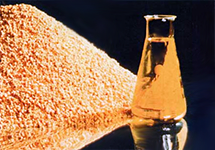Miles Pomper
May 28, 2014

Highly Enriched Uranium
View the full article by The Stanley Foundation:
Crossing the Finish Line: Ending the Civilian Use of Highly Enriched Uranium
Winning global support to phase out the civilian use of highly enriched uranium (HEU) has been one of the seminal achievements of the Nuclear Security Summit process that President Barack Obama started four years ago.
For decades, the United States has sought to secure and minimize the worldwide use of this dangerous nuclear bomb-making material. Important US-led efforts such as the Global Threat Reduction Initiative have successfully eliminated civilian HEU in more than two dozen countries, removing enough material to build 200 nuclear weapons. However, broader international efforts have been too often hampered by a lack of multilateral support.
As the final summit approaches in 2016, the world needs a comprehensive strategy to eliminate HEU from the civilian sector, write CNS Senior Research Associate Miles Pomper and student Philippe Mauger in a new policy analysis brief for the Stanley Foundation. Pomper and Mauger argue that the United States, the Netherlands, and South Korea should take full advantage of the NSS mechanisms—while they have them—to build sustained support for civilian HEU elimination.
Pomper and Mauger offer a dozen specific recommendations, including:
- Calling for an explicit commitment in the NSS communiqué to end civilian HEU use, when technically and economically feasible, not merely to minimize it.
- A gift basket or a joint statement drafted by the NSS troika of hosts (the United States, South Korea, and the Netherlands) that provides a road map for ending civilian HEU use within a clear time period.
- A commitment at the 2016 NSS to end exports of the vital HEU-based isotope molybdenum-99 (Mo-99) unless international experts certify that global non-HEU production capacity is not sufficient.
- Continued attempts to convince Belarus and South Africa to reduce the risk created by their HEU stockpiles, including through several potential compromises with South Africa.
- Efforts to build on the success of an effort to remove hundreds of kilograms of weapon-grade HEU from Japan.
